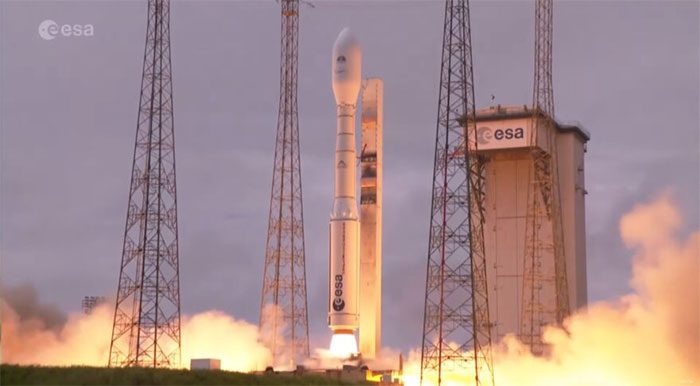On December 21 (Vietnam time), the Vega-C rocket, developed by the European Space Agency (ESA), lost contact shortly after launching from the French overseas territory of French Guiana during a mission to place two Airbus satellites into orbit.

European Space Agency (ESA) launches the Vega-C rocket. (Photo credit: ESA)
Arianespace, the aerospace company, reported that at 22:47 on December 20 (08:47 on December 21 Vietnam time), just 10 minutes after liftoff from the Guiana Space Centre in Kourou (France), the Vega-C rocket deviated from its planned trajectory and lost contact. According to Arianespace, the incident occurred during the second stage of the launch, effectively ending this mission for Vega-C. Arianespace’s CEO, Stéphane Israël, confirmed: “The mission has failed.”
Currently, Arianespace is analyzing the data to determine the cause of the launch failure. Initial data indicates there was no detection of debris after the Vega-C rocket left the launch pad.
The Vega-C rocket was launched to place two Earth observation satellites, manufactured by Airbus, into orbit, with the aim of providing high-quality images of all locations on Earth several times a day.
This launch marked the first commercial flight of the Vega-C rocket following its successful inaugural launch on July 13. The launch was initially scheduled for November 24 but was delayed for a month due to technical issues at the launch site. This was the fifth and final launch at the Guiana Space Centre in Kourou for this year.
According to ESA, the Vega-C rocket is a superior version compared to the previous generation Vega rocket. The first stage, P120C, of the Vega-C is based on the P80 version of the Vega rocket. The upper stage module Attitude Vernier (AVUM+) of the Vega-C rocket has enhanced liquid fuel capacity to transport payloads, humans, weapons, or spacecraft to various orbits based on mission requirements, as well as allowing the rocket to operate longer in space and undertake additional missions.
The new rocket version, named Vega-E, is expected to debut in 2026.


















































